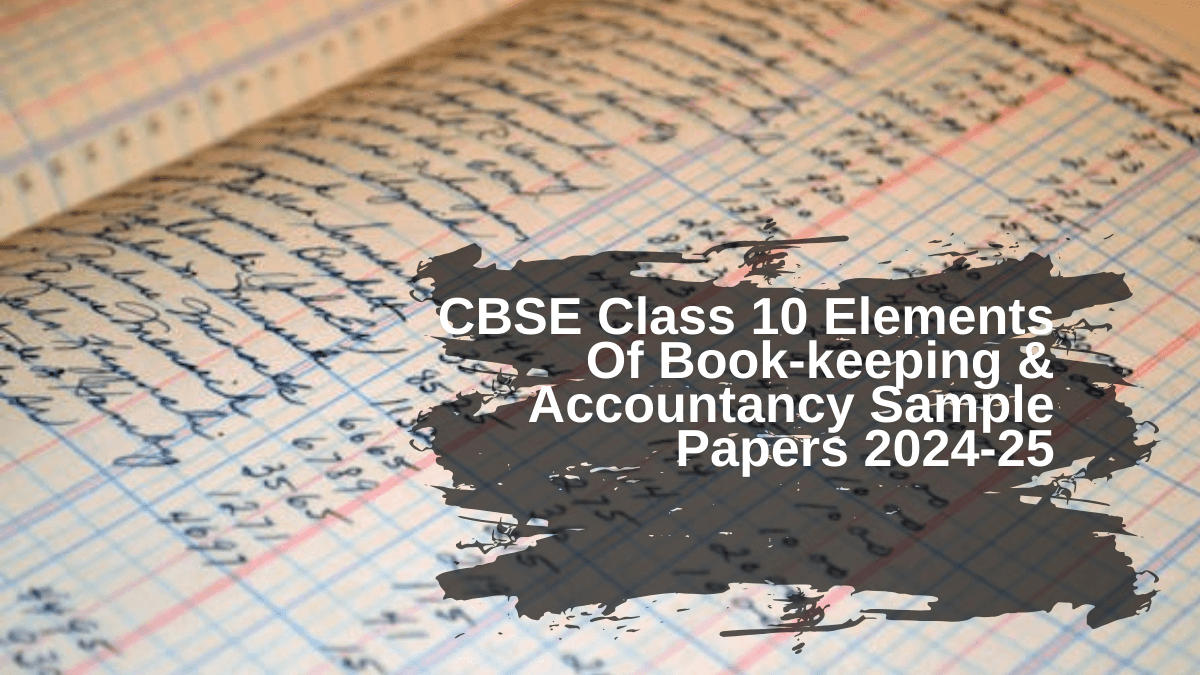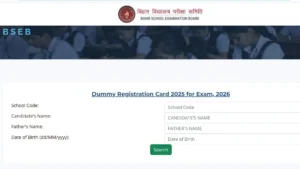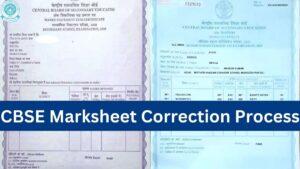The Central Board of Secondary Education has released the latest CBSE Class 10 Elements Of Book-keeping & Accountancy Sample Papers 2024-25. In bookkeeping subject, an account is a collection of assets, liabilities, income, expenses, and equity represented by distinct ledger sheets, and changes in value are documented chronologically using debit and credit entries. Students can get the Elements of Bookkeeping and Accountancy sample paper PDF for free from this article.
CBSE Class 10 Elements Of Book-keeping & Accountancy Sample Paper 2024-25
CBSE Class 10 Elements Of Book-keeping & Accountancy is the recording of financial transactions as part of the accounting process in business. This subject consists study of purchases, sales, receipts, and payments made by an individual or organization/corporation are all examples of transactions. There are various traditional techniques of bookkeeping, such as the single-entry bookkeeping system and the double-entry bookkeeping system. While these may be looked at as “real” bookkeeping, any procedure that involves the recording of financial transactions is considered bookkeeping.
CBSE Class 10 Elements Of Book-keeping & Accountancy Sample Paper 2025
Elements of Bookkeeping and Accountancy is a subject that focuses on the recording and analysis of financial transactions in a firm. These Book-keeping entries, known as posts, are recorded in a book of final entries or ledger. CBSE Class 10 Elements Of Book-keeping & Accountancy Sample Papers 2025 from the table will help students practice more effectively and achieve well in the CBSE board exams.
| CBSE Class 10 Elements of Book-Keeping & Accountancy Paper 2024 PDF | ||
| Year |
Question Paper PDF LInk
|
Solution Key
|
| 2024-25 | Click Here | Click Here |
Class 10 Previous Years Elements Of Book-keeping Sample Papers
Students can view the Class 10 Previous Years Elements Of Book-keeping Sample Papers by downloading the PDF that we have provided for them.
CBSE Class 10 Accountancy Sample Papers with Solution
Here you can find the most CBSE Class 10 Accountancy Sample Question Papers with Solutions and marking scheme. Students can get the sample paper PDF for free.
| CBSE Class 10 Elements of Book-Keeping & Accountancy Question Paper 2024 PDF (Solution + Marking Scheme) | |
| Year |
Question Paper PDF LInk
|
| 2024 | CBSE Class 10 Elements of Book Keeping & Accountancy Marking Scheme Question Paper 2023-24 |
| 2023 | CBSE Class 10 Elements of Book Keeping & Accountancy Marking Scheme Question Paper 2022-23 |
| 2022 (Term 1) | Class 10 (Term-I) Elements of Bookkeeping & Accountancy Marking Scheme Question Paper 2021-2022 |
| 2022 (Term 2) | CBSE Class 10 (Term-2) Elements of Book Keeping & Accountancy Marking Scheme Question Paper 2021-2022 |
| 2022 | CBSE Class 10 Elements of Book Keeping & Accountancy Marking Scheme Question Paper 2021-22 |
| 2020 | CBSE Class 10 Book Keeping and Accountancy Marking Scheme Question Paper 2019-20 |
| 2021 | CBSE Class 10 Elements of Book-Keeping & Accountancy Marking Scheme Question Paper 2020-21 |
| 2019 | CBSE Class 10 Elements Of Book-Keeping Accountancy Marking Scheme Paper 2018-19 |
CBSE Board Elements Of Book-keeping & Accountancy Papers 2024
Now that the kids have received the CBSE Class 10 Elements Of Book-keeping & Accountancy Sample Question Papers 2024-25, we are sharing the marking scheme for the CBSE Class 10 sample.
| CBSE Class 10 Elements of Book-Keeping & Accountancy Question Paper 2024 PDF | |
| Year | Question Paper PDF LInk |
| 2024 | Click Here |
CBSE Board Class 10 Accountancy Papers of the Last 6 Years
CBSE Board Class 10 Accountancy Question Paper from 2018 to 2023 are given below –
| Other Related Sample Papers | |
| CBSE Class 10 SST Sample Paper 2024-25 | CBSE Class 10 Maths Sample Paper 2024-25 |
| Class 10 English Sample Paper 2024-25 | Class 10 Science Sample Paper 2024-25 |









 Bihar Board 10th Dummy Registration Card...
Bihar Board 10th Dummy Registration Card...
 Wildlife Conservation Efforts in India P...
Wildlife Conservation Efforts in India P...
 CBSE Marksheet Correction Online, Change...
CBSE Marksheet Correction Online, Change...









